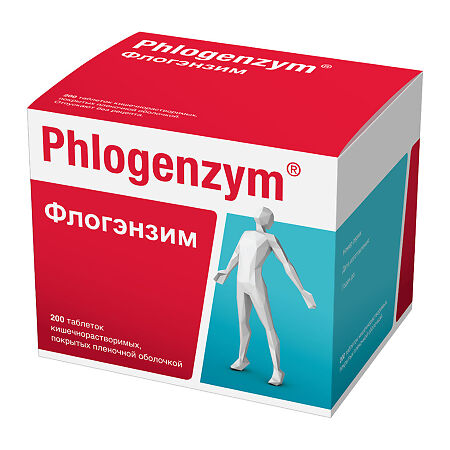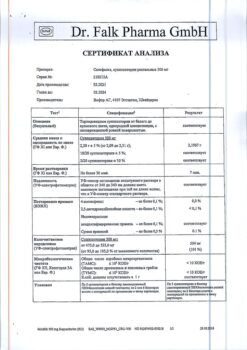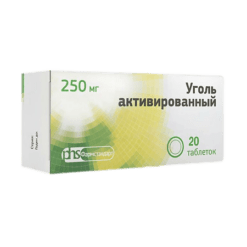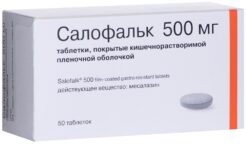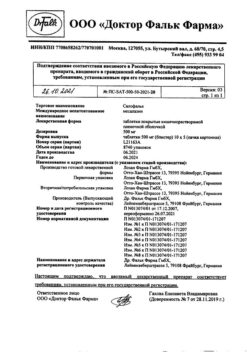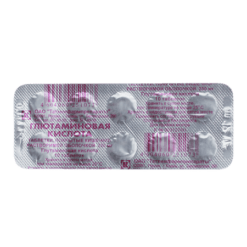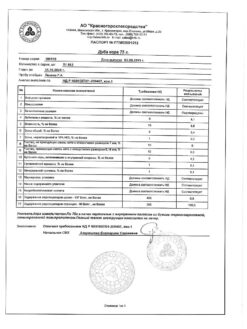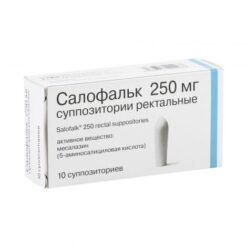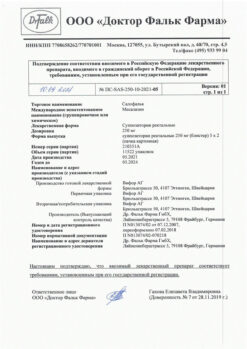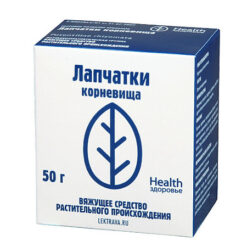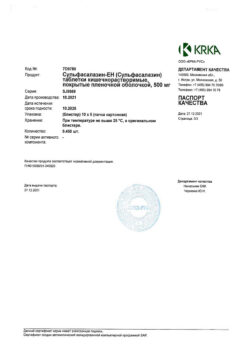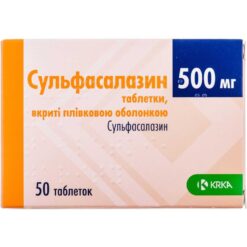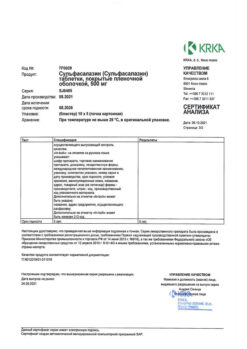No products in the cart.
Flogenzyme, 200 pcs.
€1.00
Out of stock
(E-mail when Stock is available)
Description
FLOGENSIM is a new generation drug consisting of a combination of highly active proteolytic enzymes (enzymes) of plant and animal origin – bromelain and trypsin combined with rutin.
In combination the enzymes have pleiotropic (multiple) effects with different pharmacological actions on pathophysiological and biochemical processes. Enzymes of the drug realize their therapeutic effects through anti-inflammatory, immunomodulatory, anti-aggregant, fibrinolytic, thrombolytic, antiedematous and secondary analgesic actions. Tablets of the drug, coated with an enteric coating, transiently pass the upper gastrointestinal tract without damaging the stomach, are absorbed in the small intestine by resorption of intact molecules (endocytosis, pinocytosis).
The proteases of the drug, binding with blood transport proteins (α-2-macroglobulin and α-1-antitrypsin), form a reversible protease-antiprotease complex in which the antigenic determinants of exogenous proteases of the drug are masked, which prevents allergic reactions. As a result of formation of the complex with enzymes, antiprotease (α-2-macroglobulin) changes into the active form which functions as an extracellular regulator of proinflammatory cytokines and growth factors, performing their transport, clearance and elimination.
The formation of an active protease-antiprotease complex allows proteolytic enzymes to move safely through the vascular bed to the focus of inflammation and to the site of injury, regardless of the localization in the body. The complex retains and slows down the elimination of proteolytic enzymes of the drug from the body, increases the time of their circulation in the vascular bed and accordingly the therapeutic effect. Getting into the center of inflammation and wounds, proteolytic enzymes break down (hydrolyze) damaged proteins, tissues and eliminate (remove) cellular debris (detritus), helping to accelerate wound cleansing and healing.
The drug has a positive effect on the course of the inflammatory process, modulates the body’s defense reactions, which contributes to the physiological course of inflammation at different stages. Proteolytic enzymes of the product accelerate decomposition of inflammatory mediators, break immune complexes and membrane deposits, increase activity of phagocytes and natural killer cells and stimulate interferonogenesis. Proteases of the drug decrease level of pro-inflammatory cytokines (IL-1β, IL-6, IL-8, INF-γ, TNF-α) and increase production of anti-inflammatory cytokines (including IL-4, IL-10), regulate level of Ig and blood antibodies. Enzymes of the preparation limit pathological manifestations of autoimmune and immunocomplex processes and restore immunological reactivity of the body.
The proteases of the drug decrease the level of transforming growth factor β, the increase of which leads to excessive scarring. Proteolytic enzymes have a regulatory effect on the synchronization of basal membrane formation (laminin), modulation of the wound process and expression of angiogenesis factors (vasculoendothelial growth factor, fibroblast growth factor and several other factors). Thus the enzymes of the drug contribute to improvement of reparative processes, prevention of formation of hypertrophic and keloid scars, development of adhesions after surgical interventions on abdominal cavity.
The enzymes of the preparation decompose and remove damaged tissues, accelerate resolution of hematomas and edemas due to normalization of vascular wall permeability, decrease of interstitial infiltration by plasma proteins, increase of elimination of protein detritus and fibrin deposits, improvement of microcirculation and trophic processes in the damaged area. Optimization by proteolytic enzymes of the inflammatory process by reducing oncotic pressure and tissue edema, reducing pressure on nerve endings, elimination of ischemia and normalization of microcirculation, direct proteolysis of inflammatory mediators enables proteases to exert secondary analgesic effect. At the same time proteolytic enzymes provide stimulation of healing and reparation processes, decrease the risk of thromboembolic complications during long-term immobilization, prevent development of trophic disorders and purulent complications.
The enzymes of the drug have a positive effect on improvement of microcirculation, increasing delivery of oxygen and nutrients to the wound, reduction of inflammation in the lesion, maintaining the physiological process of regeneration and acceleration of organ and tissue function recovery.
The drug improves rheological properties of blood (viscosity and fluidity) due to positive effect on the functional state of blood cells and vascular wall, plasticity (deformability) of red blood cells, stabilization of endothelial permeability, increase of fibrinolytic activity of blood serum, decrease of density of adhesive molecules, decrease of platelet aggregation (sticking).
Proteolytic enzymes reduce the number of activated forms of platelets (spheroequinocytes) and micro- and macroaggregates, thus reducing the risk of thrombosis in blood vessels, and at the same time participate in the lysis of formed clots. Proteolytic enzymes reduce the level of atherogenic lipids, helping to increase HDL, reducing the risk of atherosclerosis and vascular disorders.
The preparation improves blood supply to bronchi and lung tissue of chronic respiratory diseases including those caused by smoking, improves viscosity of bronchial secretion, function of intermittent epithelium, restores drainage function of bronchi, thins sputum which facilitates breathing and reduces cough.
The product’s proteolytic enzymes increase the effectiveness of antibiotics while reducing the undesirable effects of antibiotic therapy (dysbiosis, irritable bowel syndrome). Proteases improve breakdown of substrates, optimize microbiota balance and contribute to restoration of intestinal endoecology.
Indications
Indications
In complex therapy and prevention of the following diseases and conditions:
surgery – postoperative recovery and rehabilitation of patients (improving reparative processes and regeneration), postoperative purulent-inflammatory complications, preventing the development of adhesions and the formation of a keloid scar, reducing the risk of thromboembolic complications during prolonged immobilization;
traumatology – bone fractures, tendon and ligament injuries, soft tissue bruises and hematomas, sports injuries, burns, improving the integration of endoprostheses, osteosynthesis;
angiology – acute deep vein thrombosis, superficial vein thrombophlebitis, postthrombotic disease, obliterating atherosclerosis of the arteries of the lower extremities and other chronic angiopathy, microcirculation disorders, lymphatic edema (lymphedema);
urology – acute and chronic inflammation of the genitourinary tract (cystitis, urethritis, cystopyelitis, prostatitis);
gynecology – acute and chronic inflammatory diseases of the pelvic organs (adnexitis, salpingoophoritis), vascular complications of the menopause, reducing the frequency and severity of complications of hormone replacement therapy;
cardiology – coronary artery disease, prevention of angina attacks, reducing the risk of vascular accidents and recurrent heart attacks;
gastroenterology – hepatitis;
rheumatology – rheumatoid arthritis, ankylosing spondylitis, reactive arthritis, rheumatic soft tissue lesions;
neurology – ischemic stroke, multiple sclerosis;
pulmonology – pneumonia, chronic obstructive pulmonary disease;
dentistry – prevention of complications in the postoperative period during tooth extraction, purulent-inflammatory diseases of the maxillofacial area, rehabilitation and recovery after surgical interventions in the maxillofacial area, improvement of implant integration, osteosynthesis.
Pharmacological effect
Pharmacological effect
PHLOGENZYME is a new generation drug consisting of a combination of highly active proteolytic enzymes (enzymes) of plant and animal origin – bromelain and trypsin in combination with rutin.
In combination, enzymes have a pleiotropic (multiple) effect, having a variety of pharmacological effects on pathophysiological and biochemical processes. The enzymes of the drug realize their therapeutic effects through anti-inflammatory, immunomodulatory, antiplatelet, fibrinolytic, thrombolytic, decongestant and secondary analgesic effects. Enteric-coated tablets of the drug pass transiently through the upper gastrointestinal tract without injuring the stomach and are absorbed in the small intestine by resorption of intact molecules (endocytosis, pinocytosis).
The proteases of the drug, binding to the transport proteins of the blood (α-2-macroglobulin and α-1-antitrypsin), form a reversible protease-antiprotease complex, in which the antigenic determinants of the exogenous proteases of the drug are masked, which prevents allergic reactions. As a result of the formation of a complex with enzymes, antiprotease (α-2-macroglobulin) transforms into an active form, which functions as an extracellular regulator of proinflammatory cytokines and growth factors, carrying out their transport, clearance and elimination.
The formation of an active protease-antiprotease complex allows the safe movement of proteolytic enzymes along the vascular bed to the site of inflammation and to the site of injury, regardless of the location in the body. The complex retains and slows down the excretion of proteolytic enzymes of the drug from the body, increases their circulation time in the vascular bed and, accordingly, the therapeutic effect. Once at the site of inflammation and wounds, proteolytic enzymes break down (hydrolyze) damaged proteins and tissues and eliminate (remove) cellular debris (detritus), helping to accelerate the cleansing and healing of the wound.
The drug has a positive effect on the course of the inflammatory process, modulates the body’s defense reactions, which contributes to the physiological course of inflammation at different stages. The proteolytic enzymes of the drug accelerate the breakdown of inflammatory mediators, break down immune complexes and membrane deposits, increase the activity of phagocytes and natural killer cells, and stimulate interferonogenesis. The drug’s proteases reduce the level of pro-inflammatory cytokines (IL-1β, IL-6, IL-8, IFN-γ, TNF-α) and help increase the production of anti-inflammatory cytokines (including IL-4, IL-10), regulate the level of Ig and blood antibodies. The drug’s enzymes limit the pathological manifestations of autoimmune and immune complex processes and restore the body’s immunological reactivity.
The drug’s proteases reduce the level of transforming growth factor β, an increase in which leads to excessive scarring. Proteolytic enzymes have a regulatory effect on the synchronization of the formation of the basement membrane (laminin), modulation of the wound process and the expression of angiogenesis factors (vasculoendothelial growth factor, fibroblast growth factor and a number of other factors). Thus, the enzymes of the drug help improve reparative processes, prevent the formation of hypertrophic and keloid scars, and the development of adhesive disease after surgical interventions in the abdominal cavity.
The enzymes of the drug break down and remove damaged tissue, accelerate the resorption of hematomas and edema by normalizing the permeability of vascular walls, reducing the infiltration of the interstitium with plasma proteins, increasing the elimination of protein detritus and fibrin deposits, improving microcirculation and trophic processes in the damaged area. Optimization of the inflammatory process by proteolytic enzymes by reducing oncotic pressure and tissue edema, reducing pressure on nerve endings, eliminating ischemia and normalizing microcirculation, direct proteolysis of inflammatory mediators allows proteases to have a secondary analgesic effect. At the same time, proteolytic enzymes stimulate the healing and repair processes, reduce the risk of thromboembolic complications during prolonged immobilization, and prevent the development of trophic disorders and purulent complications.
The enzymes of the drug have a positive effect on improving microcirculation, increasing the delivery of oxygen and nutrients to the wound, reducing inflammation at the site of damage, maintaining the physiological process of regeneration and accelerating the restoration of the function of organs and tissues.
The drug improves the rheological properties of blood (viscosity and fluidity) due to a positive effect on the functional state of blood cells and the vascular wall, plasticity (deformability) of red blood cells, stabilization of endothelial permeability, increasing fibrinolytic activity of blood serum, reducing the density of adhesive molecules, reducing platelet aggregation (sticking together).
Proteolytic enzymes reduce the number of activated forms of platelets (spheroechinocytes) and micro- and macroaggregates, i.e. reducing the risk of thrombus formation in blood vessels, and at the same time participate in the lysis of formed blood clots. Proteolytic enzymes reduce the level of atherogenic lipids, helping to increase HDL, reducing the risk of atherosclerosis and vascular disorders.
The drug improves blood supply to the bronchi and lung tissue in chronic respiratory diseases, incl. caused by smoking, improves the viscosity properties of bronchial secretions, the function of the ciliated epithelium, restores the drainage function of the bronchi, thins sputum, which makes breathing easier and reduces cough.
The proteolytic enzymes of the drug increase the effectiveness of antibiotics, while simultaneously reducing the undesirable effects of antibiotic therapy (dysbiosis, irritable bowel syndrome). Proteases improve the breakdown of substrates, optimize the balance of microbiota, and contribute to the restoration of intestinal endoecology.
Active ingredient
Active ingredient
Trypsin, Rutoside, Bromelain
Composition
Composition
Active ingredients:
bromelain,
trypsin,
rutin (rutoside).
Excipients:
lactose,
maize starch,
magnesium stearate,
stearic acid,
purified water,
silicon dioxide colloidal anhydrous,
talc.
Pregnancy
Pregnancy
Use during pregnancy and lactation only after consultation with a doctor.
Contraindications
Contraindications
individual intolerance to the components of the drug;
congenital or acquired bleeding disorders;
childhood.
With caution: hemodialysis (after consultation with a doctor).
Side Effects
Side Effects
From the digestive system: in some cases, increased frequency of stools, changes in the consistency and smell of stool. Nausea, flatulence, abdominal pain, feeling of fullness in the intestines.
Allergic reactions: rarely – skin rash, itching.
From the side of the central nervous system: headache, dizziness, exanthema, general weakness.
Storage conditions
Storage conditions
In a dry place, at a temperature of 15–25 °C
Shelf life
Shelf life
3 years
Manufacturer
Manufacturer
Mucos Pharma, Germany
Additional information
| Shelf life | 3 years |
|---|---|
| Conditions of storage | In a dry place, at 15-25 °C |
| Manufacturer | Mukos Pharma, Germany |
| Medication form | enteric soluble tablets |
| Brand | Mukos Pharma |
Related products
Buy Flogenzyme, 200 pcs. with delivery to USA, UK, Europe and over 120 other countries.

